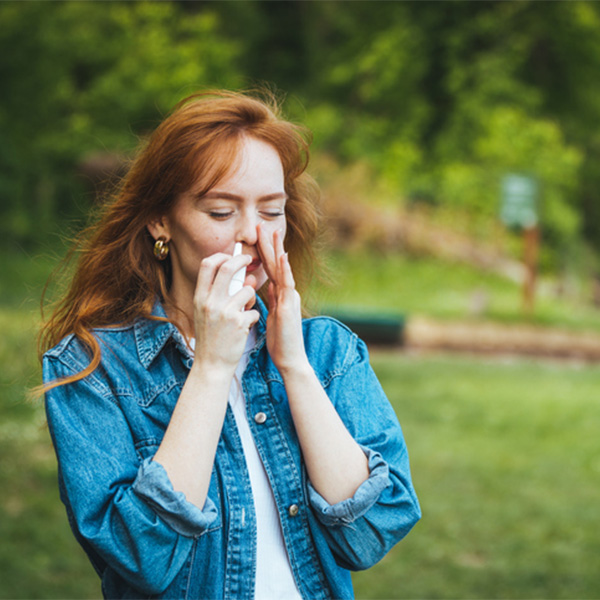
Can Allergies Cause Migraines?
If you suffer from both allergies and migraines, you might have wondered if the two are connected. Can that pounding headache you get after exposure to allergens be related to your allergy symptoms? The answer isn’t as simple as a direct cause-and-effect, but there is a notable link between the two. Here’s what you need to know about how allergies can contribute to migraines — and what you can do to manage both.
A Look at Allergies and Migraines
Allergies occur when your immune system overreacts to substances like pollen, dust mites, mold, or pet dander. This reaction triggers inflammation, causing symptoms like sneezing, congestion, itchy eyes, and a runny nose.
On the other hand, migraines are severe headaches often accompanied by nausea, sensitivity to light, and visual disturbances. While migraines have many potential triggers — ranging from hormonal changes to stress and environmental factors — some individuals notice a connection between their allergy flare-ups and migraine episodes.
4 Ways Allergies Can Trigger Migraines
 While allergies don’t directly cause migraines, they can set off a chain reaction that contributes to migraine development. Here’s how:
While allergies don’t directly cause migraines, they can set off a chain reaction that contributes to migraine development. Here’s how:
1. Sinus Congestion and Inflammation
Allergies often cause inflammation in the nasal passages and sinuses, leading to sinus congestion. This pressure buildup in your head can sometimes trigger sinus headaches, which are often mistaken for migraines. Additionally, sinus pressure can worsen an existing migraine, increasing the severity of the headache.
2. Histamine Release
When exposed to allergens, your body releases histamines to fight off the perceived invader. Histamines are responsible for many common allergy symptoms, but they can also cause blood vessels in the brain to dilate, potentially contributing to the onset of migraines.
3. Weather Changes
Allergens like pollen are often at their worst during specific weather conditions—such as high winds or drastic temperature changes. For many migraine sufferers, these same weather patterns can also trigger migraines. Thus, someone with both allergies and migraines may experience symptoms from both conditions during certain times of the year.
4. Immune System Overload
When your immune system is fighting off allergens, your body may become more sensitive to other migraine triggers, such as stress, lack of sleep, or certain foods. Essentially, the extra strain on your immune system may make you more vulnerable to a migraine attack.
Is It a Sinus Headache or a Migraine?
 It’s important to differentiate between a sinus headache and a migraine, as both can cause similar symptoms. A sinus headache is typically characterized by:
It’s important to differentiate between a sinus headache and a migraine, as both can cause similar symptoms. A sinus headache is typically characterized by:
- Pressure around the eyes, cheeks, or forehead
- A stuffy or runny nose
- Pain that worsens when bending over or lying down
Meanwhile, migraines often cause:
- Throbbing or pulsing pain, usually on one side of the head
- Nausea or vomiting
- Sensitivity to light or sound
- Visual disturbances (like seeing spots or flashes)
Sometimes, a sinus headache can develop into a migraine, or the two may occur simultaneously. If you’re unsure whether your headache is related to your allergies or a migraine, consult your healthcare provider for an accurate diagnosis and appropriate treatment.
Managing Migraines Linked to Allergies
If you suspect that your allergies are triggering or worsening your migraines, there are several steps you can take to manage both conditions:
Control Your Allergies
Avoid Triggers
Identify and minimize exposure to allergens such as pollen, pet dander, and dust mites. Keep windows closed during high pollen seasons, use air purifiers, and regularly clean your home to reduce allergen buildup.
Allergy Medications
Over-the-counter or prescription antihistamines, decongestants, and nasal sprays can help reduce allergy symptoms that might contribute to migraines. However, it’s important to choose medications that do not cause rebound headaches.
Immunotherapy
Allergy shots or sublingual immunotherapy (SLIT) can help desensitize your immune system to allergens, reducing both allergy symptoms and the potential for related headaches.

Migraine-specific Treatment
Prescription Medications
Migraine medications such as triptans or preventative medications can help reduce the frequency and severity of migraines, especially if your headaches are frequent and debilitating.
Healthy Lifestyle Choices
Maintaining regular sleep patterns, staying hydrated, eating a balanced diet, and managing stress are key components of migraine prevention.

When to Seek Help
If you regularly experience migraines or headaches that coincide with allergy symptoms, it’s important to seek medical advice. A healthcare provider can help determine whether your migraines are triggered by allergies or another underlying issue and develop a comprehensive treatment plan.
Get Personalized Care at Northeast Allergy
At Northeast Allergy, we understand how frustrating it can be to manage both allergies and migraines. Our team of allergists can help you find relief from your allergy symptoms and explore treatment options that may reduce your risk of allergy-related migraines.
Don’t let your symptoms control your life — request an appointment with us today to create a personalized treatment plan tailored to your unique needs.



